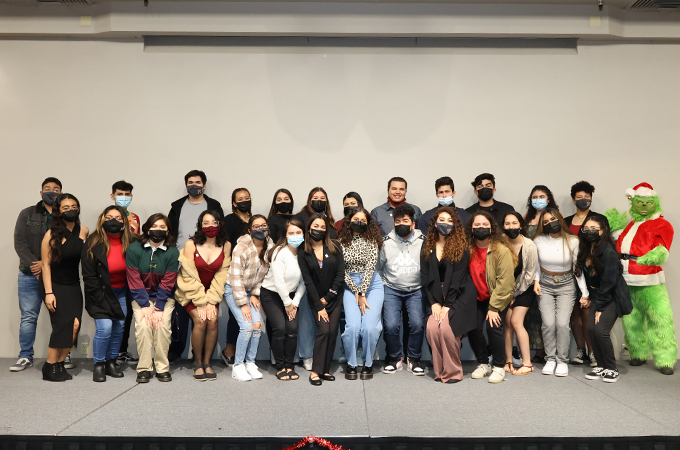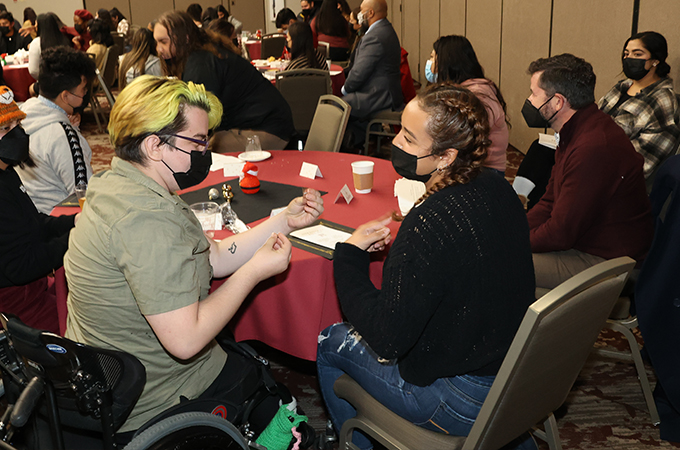On December 9, U of Rs First-Generation Student Programs hosted the Students Together Empowering Peers (STEP) Banquet acknowledging first-generation students who were completing their first semester at the University. The event was held in person for the first time since December 2019.
More than 80 students from STEP were in attendance, as well as first-generation faculty and staff. Everyone came together to celebrate what it means to be first-generation and the resiliency that carried them through their first in-person semester.
“It really opened up my eyes to learn more about first-generation staff on campus, as well as alumni,” said Jade Rosales ‘25. “It was like, ‘Wow, that can be me someday.’”
The event was emceed by two University of Redlands first-generation students, Carlos Chavez ’23 and me, who were co-lead mentors for the STEP program and who ran the two STEP classes in the fall. Being part of this amazing event brought back memories of the first time I walked into STEP in 2018.
Alumni speaker Anthony Castellon ‘21, who graduated with a Bachelor of Arts and a Johnston Center for Integrative Studies concentration in “Unlocking Potential within College Students,” was also a former STEP co-lead mentor. “As first-gen students, we’re running into this new chapter head-on, without any clue of how to do it, without any knowledge from our families,” said Castellon. “The love and support of those around me helped me succeed. I gave my heart and soul to this community from day one, because they gave it right back. They praised me when I was at my highest, and offered a hand when at my lowest. In truth, this community is what glued me to this campus.”
The banquet ended with a celebratory first-generation student pinning, a symbol of our community of resilience and talent that honors a long legacy of first-generation graduates at the U of R.

Words of encouragement and reflection
U of R’s first-generation faculty, staff, and students shared some of their experiences navigating the unknown with the Bulldog Blog.
“My father was a mechanic, and my mom worked in a bank. My whole life, they encouraged me to go to school so that I could have a better life than they did, even though they had a pretty amazing life. When I graduated from college, I’ll never forget the pride that I saw in my mom and dad’s eyes—how proud they were of my accomplishments. They told me I could accomplish anything I wanted to do. Their support and encouragement motivated me to continue my education, get a master’s degree, complete a doctorate … and get to where I am in life. And I’m not done! My learning process has been invaluable, and I’m forever grateful to my parents.”
—Joe Modica, Director of the School of Music
“In the 1980s, first-generation students were not formally organized or recognized: we were expected to strive, not complain, and succeed and the support we received tended to be implicit rather than explicit.
“I clearly remember the first faculty member I encountered who discussed her first-generation status in a classroom: it was game-changing for me and let me see myself in the front of that classroom and luckily happened in my first year. It was not easy (and the lack of intergenerational wealth remained a persistent problem, I won’t lie), but I got the Ph.D. and got to the front of that classroom.”
—Kathy Feeley, Associate Dean, College of Arts and Sciences and Professor of History
“Being first-generation means I must work a lot harder than most of my peers who are not first-generation. I have no one in my family to ask for help and no one to guide me through college. But the one thing that has helped me tremendously while in college is my first-generation college community here on campus. It surprised me because I did not realize how many of us there were and how important it is that we take pride in being first-generation. It made me want to work harder to get to where I want to be. Because of programs such as STEP (Students Together Empowering Peers) or Summer Bridge, I got through my first year of college. They have been impacting my life since the summer before arriving on campus as a freshman. I owe these two programs a lot.”
—Lesley Ann Bello ’23
“I wish I had known that going to college as a first-gen student was more than just being smart, testing well, or taking AP classes. It was also challenging emotionally and spiritually. …
“[Because I am a first-generation college graduate], my ultimate goal is to educate and love on students as a middle school mathematics teacher. I recognize the power in that, especially since I am student teaching in the same middle school that I attended. When my students look at me, they see somebody who looks like them doing STEM. I can say, ‘Look at me: from start to finish, I came grew up in the same neighborhood that you’re from, and look how far I’ve gone. You can do it as well.’”
—Amber N. Williams ’22 (M.A. Education, Teaching and Learning)
“College as a first-gen student was (and still is) a journey. It took me six years to finish my associate’s degree because I was just following the catalog by myself—I didn’t have an advisor or guidance counselor to help me finish my degree. When trying to decide what 4-year university I should attend, I had to talk to professors and take campus tours by myself. And paying for college was the most challenging—I had to work two to three jobs. It was a hard and lonely road.
Luckily in my undergrad, I was able to find a job on campus that introduced me to administrative work, which led me to my job at Redlands. Now that I’m getting my master’s degree, I study with a strong cohort of students that encourages, prays, and supports me when I want to throw in the towel. My journey has been a leap of faith. And sometimes you must take a leap of faith to accomplish your dreams.”
—Vanessa Richardson, ’22 (M.S. Organizational Leadership)
“My dad was hospitalized the day before my mom and I headed to Albany to start my junior year at the State University of New York. I felt guilty for leaving and was afraid of being away from home. I was afraid my roommate wouldn’t like me. And having never visited the campus (not something I recommend!) I was afraid I wouldn’t be able to find my way around campus (I believe the campus population at the time was 22,000 students). I also wondered if I could do the [academic] work. To see my way through, I had to quickly develop outward-facing confidence, fearful that if I did not, I would be the brunt of jokes, and self-doubt would get the best of me, and failure wasn’t an option.
“[Now I know] connection and engagement are your keys to success! I attribute my ability to persevere to the decision I made to become a Resident Assistant (RA), ironically, because I needed the money. It made all the difference because the role allowed me to be surrounded by a very diverse group of people and helped me develop important life skills.”
—Donna M. Eddleman, University Dean of Student Affairs
“One of the ways I overcame the challenges as a first=-gen student was to meet new people and make friends with faculty. The transition from my senior year of high school to sophomore year was really hard because of the pandemic—I spent my first year online. But once I started making friends and talking to faculty more, I felt more comfortable and adjusted to my life at the University of Redlands.”
—Carlos Vasquez ’23
“Most of my family and extended family didn’t have the opportunity to pursue higher education. My mom and some of her siblings attended university. They graduated in Mexico, but I was the first one in my family to graduate with a bachelor’s degree in the United States.
“No one in my family could advise me on the admissions process or the financial process. As a very inexperienced 18-year-old, it was hard to trust people I didn’t know with such complicated decisions like accepting student loans. I didn’t know what I wanted to major in when I started college, and I was too nervous to ask for help. Throughout my academic journey, I made several mistakes and switched my major a few times, which delayed my completion date. As I started getting more comfortable and learning more about college, it was surprising to see how many resources were available to students that I had no idea about at the start of my program.”
“I wish I would have made more appointments with my financial advisors to ask more questions and fully understand what I was getting myself into by accepting certain loans. I also wish I would have known about the resources my university offered sooner and made frequent appointments with my academic advisor to not fall behind.”
—Melissa Villegas, Assistant Director of Academic Advising, School of Education
Learn more about the University of Redland's first-generation student programs.






